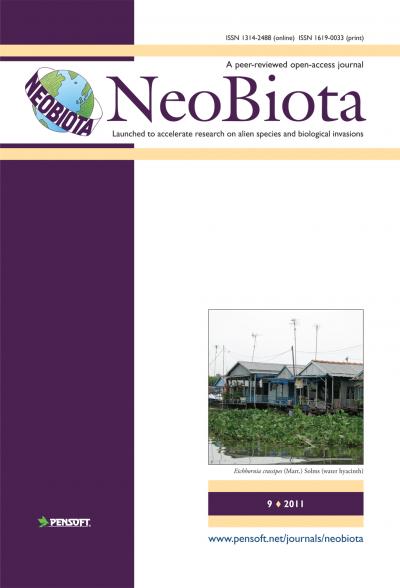Historical在18世纪欧洲景观中对加拿大灯盏花入侵的环境依赖评估的证据
IF 3
2区 环境科学与生态学
Q1 BIODIVERSITY CONSERVATION
引用次数: 1
摘要
了解入侵科学的历史根源可以帮助我们了解入侵物种的早期认知,使我们能够追踪该学科随着时间的演变,并有助于将现代研究置于背景之下。这篇论文分析了克里斯蒂安·路德维希·克劳斯250年前发表的关于18世纪欧洲景观被Erigeron [Conyza] canadensis(加拿大马草)入侵的作品,Erigeron [Conyza] canadensis是当今最常见的入侵物种之一,也是一种广泛存在的农业杂草。本文对Krause描述的生态后果和潜在机制进行了分析,他如何评估不同土地利用系统中加拿大绿叶蝉的入侵,以及他的见解如何与现有知识相一致。克劳斯认为,在退化的沙质土壤上,丰富的种子生产和长距离的风传播是优势林分形成的关键机制。他认识到与种群建立相关的各种生态系统服务,如控制侵蚀、增加土壤肥力和促进其他物种。虽然克劳斯强调了加拿大野蓟入侵对恢复退化的草地和田地的好处,但他也承认,这种引入的物种是花园里的麻烦杂草。因此,Krause的工作不仅是关于风蚀文化景观入侵的早期报告,也是基于背景的入侵评估的早期例子,说明了同一物种在不同环境中的积极和消极影响。Krause的观点可能会鼓励当前对加拿大大麻的评估,而不仅仅是基于它的存在或频率,而是基于记录的生态和社会经济影响及其相关的利弊。正如克劳斯250年前令人印象深刻地证明的那样,这些影响在不同的环境中可能截然不同,需要对同一物种做出多种反应。本文章由计算机程序翻译,如有差异,请以英文原文为准。
Historical evidence for context-dependent assessment of Erigeron canadensis invasions in an 18th-century European landscape
Understanding the historical roots of invasion science provides insights into early perceptions of invasive species, allows us to trace the evolution of the discipline over time, and helps contextualize modern research. This paper analyzes work by Christian Ludwig Krause, published 250 years ago, on the invasion of an 18 th -century European landscape by Erigeron [ Conyza ] canadensis (Canadian horseweed), one of the most common invasive species today and a widespread agricultural weed. Here an analysis is conducted of the ecological consequences and underlying mechanisms Krause described, how he evaluated E. canadensis invasions in different land-use systems and how his insights align with existing knowledge. Krause identified copious seed production and long-distance dispersal by wind as key mechanisms for the formation of dominant stands on degraded sandy soils. He recognized various ecosystem services associated with population establishment, such as erosion control, increased soil fertility, and the facilitation of other species. While Krause highlighted the benefits of E. canadensis invasions for the recovery of degraded grasslands and fields, he also acknowledged this introduced species as a troublesome weed in gardens. Thus, Krause’s work is not only an early report on the invasion of a cultural landscape subject to wind erosion but also an early example of a context-dependent invasion assessment, illustrating both positive and negative impacts of the same species in different environments. Krause’s perspective may encourage current assessments of E. canadensis not solely based on its presence or frequency, but on documented ecological and socioeconomic effects and their associated benefits or harms. As Krause impressively demonstrated 250 years ago, these effects can differ starkly in different environments, necessitating multiple responses to the same species.
求助全文
通过发布文献求助,成功后即可免费获取论文全文。
去求助
来源期刊

Neobiota
Agricultural and Biological Sciences-Ecology, Evolution, Behavior and Systematics
CiteScore
8.10
自引率
7.80%
发文量
0
审稿时长
6 weeks
期刊介绍:
NeoBiota is a peer-reviewed, open-access, rapid online journal launched to accelerate research on alien species and biological invasions: aquatic and terrestrial, animals, plants, fungi and micro-organisms.
The journal NeoBiota is a continuation of the former NEOBIOTA publication series; for volumes 1-8 see http://www.oekosys.tu-berlin.de/menue/neobiota
All articles are published immediately upon editorial approval. All published papers can be freely copied, downloaded, printed and distributed at no charge for the reader. Authors are thus encouraged to post the pdf files of published papers on their homepages or elsewhere to expedite distribution. There is no charge for color.
 求助内容:
求助内容: 应助结果提醒方式:
应助结果提醒方式:


